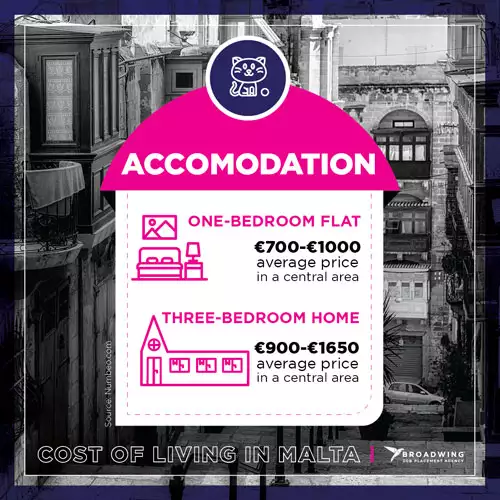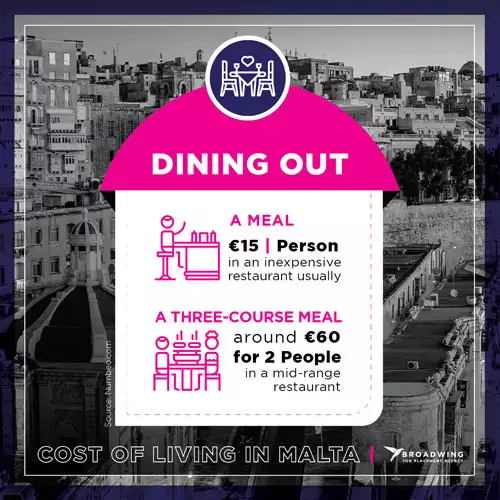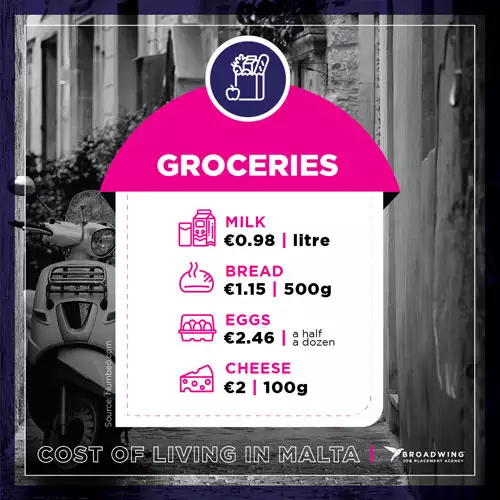Cost of Living in Malta
Figuring out how much life in a new country is going to cost is vital before packing up and starting afresh. This will help you understand what sort of salaries to expect from your new job and what sort of life you’re going to be able to live once you’ve paid off your rent and utilities every month.
If you were to compare Malta to some of the bigger, Western European cities, it is still somewhat cheap but prices have increased over the last few years. Using some of the latest statistics from Numbeo, we have put together this guide to give you a clearer picture of what you’ll be forking out for accommodation, dining out, groceries and getting around.
Living and Accommodation
If you’re planning to rent once you arrive, a one-bedroom apartment in a central area can go for anything between €700 to €1,000 a month. Apartments in highly sought-after locations like Valletta or Sliema will cost you a bit more than that. A three-bedroom property can start from around €900 up to €1,650 depending on location, amenities and so on.
Basic utilities (electricity, heating, cooling and water) should cost just under €100 a month for an 85m2 apartment. You can get a good internet connection of 60Mbps or more for around €35 monthly.
Buying property in Malta is quite an investment and there are a lot of great options out there. Naturally, if you’re looking to buy in a sought-after area you’ll be paying higher prices for smaller spaces. You would pay a bit over €3,300 per square metre for a centrally-located apartment and €2,200 for somewhere less central.


Dining Out
Like many other of its Mediterranean counterparts, the Maltese way-of-life revolves heavily around food and drink. Restaurants, bars and cafes are plentiful and often bustling with life.
A meal in an inexpensive restaurant usually goes for around €15 per person and a three-course meal for two people in a mid-range restaurant will rack up a bill of around €60. A pint of local beer (keep an eye out for Ċisk) usually costs around €2.50 or you can get a 33cl bottle of imported beer for about €3. If you’re grabbing a coffee at one of the island’s many cafes, you can expect to pay just over €2 for a cappuccino. Speciality coffee shops have been opening up around the island where you can enjoy delicious, single-origin coffees prepared in a plethora of different ways. These coffees will naturally cost a little more.
Groceries
Cooking at home is a more cost-effective way to nourish yourself and, if you enjoy cooking, you will enjoy working with the high-quality local produce available from most supermarkets and stores. A litre of milk costs €0.98, a 500g loaf of fresh white bread costs €1.15 and a half a dozen eggs costs €2.46. You can find a large variety of cheeses from all over the world but the local ġbejna (typically made from sheep milk) is normally sold for a bit less than €2 for 100g.
Most people don’t drink tap water in Malta even though it is perfectly safe to do so. If you’re not a fan of the taste however (and many people are not) you can opt to buy bottled water for €0.86 per 1.5 litres. A mid-range bottle of wine is normally sold at around €6 and a half litre bottle of local beer will cost you roughly the same as at a restaurant (€1.50).

Getting Around
In Malta, the car is king and this is quite evident the moment you land. Traffic jams are commonplace and the driving can be somewhat chaotic. That being said, the public transport system is pretty functional and can get you around quite easily. A one-way bus ticket is €1.50 in winter and €2 in summer. There is also a night service that costs €3 for a one-way trip. Alternatively, you can register for a Tal-Linja card which offers better rates.
There are a number of different taxi companies around the island which will cost you an average of €2.25 per kilometre. A number of interesting private transport alternatives have been popping up including car and scooter or ride-sharing options too which might be worth looking into.
Now that you’ve got a clearer picture of how much it will cost you to live a comfortable and pleasant life in Malta, you’re better equipped to understand what to expect from your employment package and how to manage your finances.
For more information about finding a job and working in Malta, check out our Working in Malta page.
